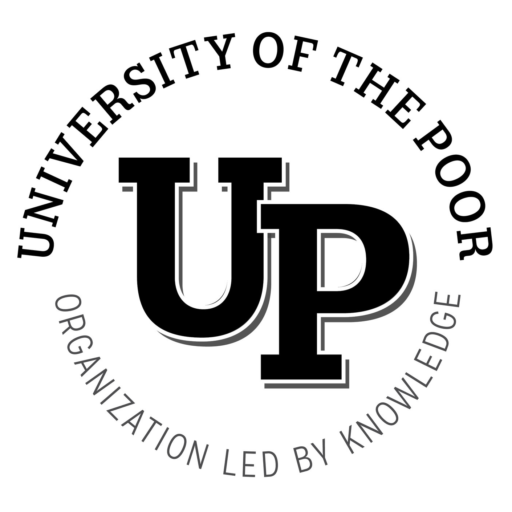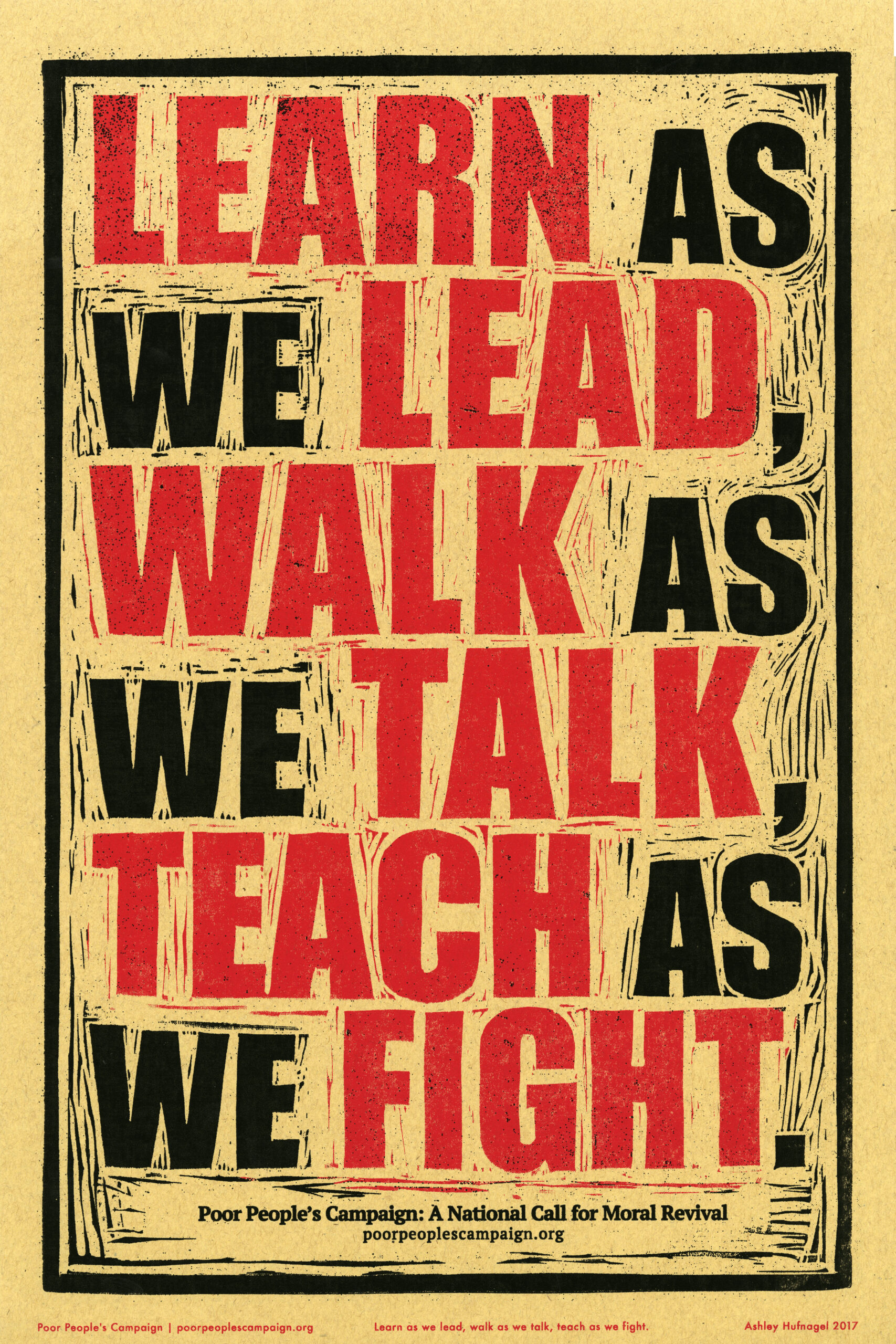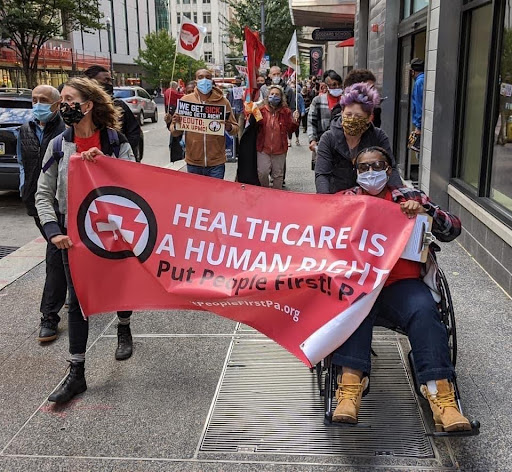Two books have been published that are must reads: “We Cry Justice: Reading the Bible with the Poor People’s Campaign” edited by Rev. Dr. Liz Theoharis and “Freedom Church of the Poor: Martin Luther King Jr’s Poor People’s Campaign” by Dr. Colleen Wessel-McCoy. These books give a clear strategic framing for those of us who are battling to transform our country so that everyone can live a decent and productive life.
Religious beliefs and values have always played an important role in the struggles of the poor for justice in U.S. history. Winning the battle for the Bible is indispensable for winning the hearts and minds of the people of the United States, and especially the poor. Dr. Wessel-McCoy examines the key lessons of the original Poor People’s Campaign, which was a turning point from a struggle for “civil rights” to a struggle for “human rights.” In “We Cry Justice”, Rev. Dr. Theoharis is joined by pastors, organizers, scholars, low-wage workers, and people living in poverty in interpreting sacred stories about the poor seeking healing, justice, and freedom.
These two books provide an understanding of, and an invitation to join, the growing movement to end poverty.
– Lenny Brody, UPoor Journal Editorial Committee
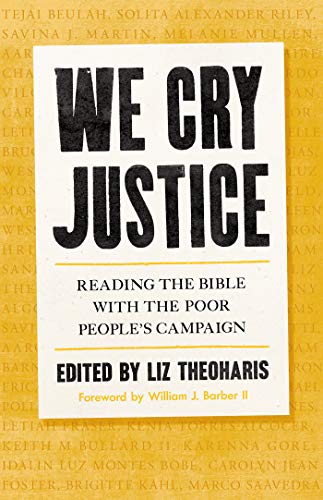
We Cry Justice: Reading the Bible with the Poor People’s Campaign
Edited by Rev. Dr. Liz Theoharis, Broadleaf Books, 241 pages – Purchase here
Reviewed by Dr. Adam Barnes
Earlier this month, the release of We Cry Justice: Reading the Bible with the Poor People’s Campaign was celebrated at a launch event at the People’s Forum in New York City. During the launch several of the contributors encouraged the audience to get a jump on their Christmas shopping by buying copies of the book for everyone they knew. They were half-joking, but it struck me how true it was that this book is indeed a precious gift and how appropriate it was to offer such a gift around the Christian holiday of Christmas.
In its 53 concise and carefully written entries we are given insights into the conditions of individual and social suffering that define our times. We are given inspiring and courageous stories of people crying out against injustice and stepping up and into leadership roles and helping build a movement to end those conditions. We are given clear, liberating analysis of well known Biblical stories and themes that have so often been used to justify the existence of poverty, defend wealth and the wealthy, and diminish and divide the poor and dispossessed. Each entry offers us prayers and questions to deepen our political and theological understanding. It is a book that can both be used as a personal spiritual devotional and a powerful organizing tool.
The ruling class has long understood and used the power of religion as a means to discipline and shape consent from the masses at the deepest level of moral belief. At best, the Christian tradition in the U.S. has been decontextualized from its history of poor people resisting and organizing against Empire and transformed into an overspitiuralized guide for personal self-help and individual charity. At worst, it has been twisted to support colonialism, slavery, nationalism, selective violence and hatred toward others, and used to thoroughly moralize the capitalist system of human exploitation and environmental degradation.
We Cry Justice helps to take back the Bible and the power of spiritual life and practice for the least of these (which is most of us). It exposes the lies of the dominant discourse on religion and puts forth a radiant vision of how we might re-imagine (and remember) our right relation to God, to each other, and to the Earth. It reminds us that, at its core, the Bible is an account of the ongoing struggle of the poor against Empire. This book is essential to the work of building a transformative social movement. As Tammy Rojas, one of the contributors from Put People First! PA, so clearly puts it:
“You can’t unite the poor and dispossessed or shift politics in Lancaster County without tackling the distorted moral narrative of White Christian Nationalism. In order to win we must win the Battle for the Bible!”
This Holiday season, as usual, the story of Christ’s birth and other themes from the Bible will be commercialized, twisted to propose charity as the solution to poverty, and otherwise used to reinforce an unholy system that is degrading life. Let us begin to resist this and draw others into resisting it by instead giving the gift of We Cry Justice: Reading the Bible with the Poor.
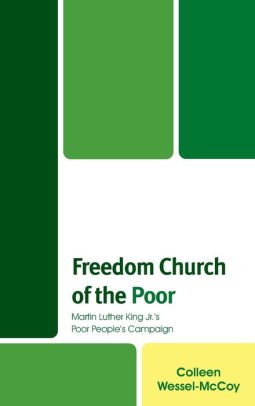
Freedom Church of the Poor: Martin Luther King Jr’s Poor People’s Campaign
By Dr. Colleen Wessel-McCoy, Rowman and Littlefield, 222 pages – Purchase here
Reviewed by Minister Savina Martin
The mission of the University of the Poor is to systematically identify and develop leaders committed to the unity of the poor and dispossessed across color lines and other lines of division, so as to build a broad-based and powerful movement to end poverty. Within this activity, the University of the Poor strives to lay the basic foundation for a network of revolutionaries. This new book by Dr. Colleen Wessel McCoy outlines years of study, research, writing, and now published work that will add to the University of the Poor’s rich library of knowledge and learning.
In his last years, King called the organized force he sought to build a “nonviolent army of the poor” and a “freedom church” of the poor. In 2020, inspired by this legacy, the Kairos Center launched the Freedom Church of the Poor, which hosts Sunday services where leaders from every front of struggle across the U.S. pray, learn, and strategize together. For over a year, powerful messages of resistance have been delivered, calling into question oppression against the historical background of Biblical empire. Services are led by the most poor and dispossessed in this country, who point out how necessary it is that we make a battle for the Bible, tell our stories, and reshape the church in America today. They read scripture together and share crucial analysis of capitalism and the forces of Christian nationalism that blame the poor for their own poverty.
In chapter 8 of her book, Dr. Wessel-McCoy expounds on the deepening and pervasive crisis that calls us to become the new and unsettling force that Dr. King once prophesied. She describes King’s work to till the soil for a moral revolution of values and writes about the threat that King posed at the end of his life, because the movement of the poor that he was organizing was an actual social force and a counter to the established power structure in America. She touches on how King’s work was surveilled, infiltrated, and co-opted, and describes the dangers of the “political police”, of which “there is nothing more critical that we as a movement today should take notice of.” She bears witness to Dr. King’s assassination and the call he made that we organize against the evils of poverty, racisim and war.
Indeed, in the decades since the 1968 Poor People’s Campaign, our movements have witnessed and been infiltrated by attacks, provocateurs, detractors, and outright disruptors. During the slow demise of the National Union of the Homeless in the mid-1980’s, infiltration came by way of illegal drugs, co-optation through certain concessions, decisions, disagreements, and division. Today, lingering questions are deeply embedded within the lessons of the union. “Did the union fail”? Or was the slow march of the union’s demise the consequence of actions taken by the ruling class to counter the power the poor wielded during that period? In their work, the union came up directly against the federal arm of the government, including the Department of Housing and Urban Development.
In Chapter 4, Wessel-McCoy outlines three conventional assessments of the 1968 Poor People’s Campaign and its decision to leave Resurrection City: 1. Failure 2. Failure with some short-term wins and 3. Failure with some long-term contributions. She grapples with the challenge of assessing whether the campaign was a success, a failure, or a mix of both, and deals with the tension between reform and revolution and the relationship of mobilizing to organizing. The same questions of success and failure came up when the media reported on the homeless union and its own Resurrection City, built on the banks of the Anacostia River for two and a half days in 1987 and which I was present for.
We had arrived at the encampment after marching for weeks and as we prepared for a major housing rally in D.C.. We set up camp on wet ground that never dried that year. As organizers worked to care for everyone present, we noticed a silver model trailer parked on a grassy embankment, day and night, and later learned that drugs were being given to some of our people. The political police showed up that weekend in many forms to disrupt and detract us from organizing to take back what was ours – our right to housing and life. We succeeded that weekend in bringing our demands to the attention of the nation, putting our folks in a position to survive long enough to march, sing, chant, and fight the powers that be. But in the long-term, we also suffered from attacks from within and without.
As I reflect on this history, I am moved by the clarity of Dr. King’s message at the end of his life, that “our nettlesome task is to discover how to organize our strength into compelling power so that the government cannot elude our demands. We must develop, from strength, a situation in which the government finds it wise and prudent to collaborate with us.” Dr. Wessel-McCoy reminds us that the 1968 Poor People’s Campaign proved how nettlesome the task of organizing as a social force with compelling power can be, especially when it becomes a thorn in the side of the powerful.
She adds in her conclusion that movements start with small, dissenting leadership, and only later do they win the rest of the nation. For religious leaders in our movements, then, the first task is to win themselves to this work and become deeply committed to orienting everything they do towards it. Wessel-McCoy writes, “This is the cross that King said would leave marks of Jesus Christ on your body and on your soul. And it is a cross that can only be known by carrying it.”
Every leader attending Freedom Church of the Poor – no matter age, race, religion or no religion, gender or non-binary, believer or non-believer, rich or poor, educated or not – has borne the scars of Jesus: of prisoners, indigenous detainees, our church-hurt folk, our poor, widowed, orphaned, hungry, unhoused, and addicted. There is a freedom church and a nonviolent army of the poor and dispossessed rising into a new and unsettling force through study, reading, research, writing, and the publishing of our narratives, stories, fight, and schools of struggles to end poverty.
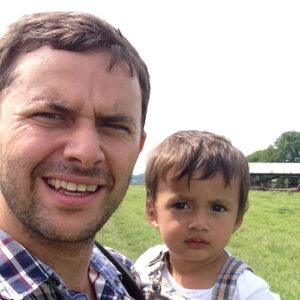
Dr. Adam Barnes is the Director of Religious Affairs at the Kairos Center and Co-lead of the National Faith Partners team for the Poor People’s Campaign.
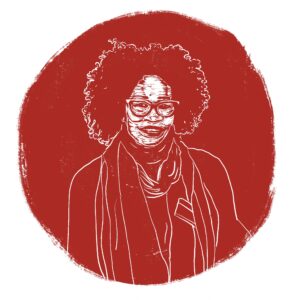
Savina Martin serves on the National Advisory and Clergy Council of the Homeless Union, the Standing Committee of the University of the Poor, and is a Tri-Chair of the Massachusetts Poor People’s Campaign. She also writes spoken-word poetry and is one of many revolving preachers at Freedom Church of the Poor.
